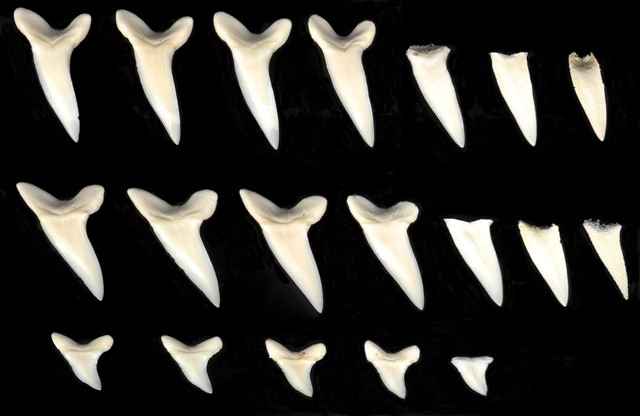-
Bill Heim posted an update in the group
 Shocking Shark Teeth 4 years, 6 months ago 4 years, 6 months ago4 years, 6 months ago
Shocking Shark Teeth 4 years, 6 months ago 4 years, 6 months ago4 years, 6 months agoUnlike mammals, sharks (and rays) regularly replace their teeth throughout their life. Fish, reptiles, archosaurs (which includes dinosaurs and crocodilians) also replace their teeth but in a different manner. The teeth of sharks and rays are in a conveyor belt system. The teeth form below the gum line from what is known as tooth bud. At first it consists of a hollow, soft chalky blade. As the tooth moves forward, the blade hardens and fills in. The root then begins forming and is complete just before emerging from the gum tissue to push out the tooth it is replacing. Each tooth is a tiny bit larger than one it replaces since the shark is growing larger. Teeth are typically replaced about once a week. The constant loss of teeth is why they are so common as fossils. The illustration are files from the upper anterior teeth of a shortfin mako shark, Isurus oxyrinchus showing the development from back (right) to front (left).

Amazing sharks replace their teeth weekly. No wonder they need to eat so much considering the mass of the tooth loss. I wonder if the replacement rate would change depending on their diet?
Studies with captive sharks in aquariums show that they actually don’t eat a lot, a few pounds a week. Now warm blooded sharks (like the Great White and mako) are more active and have a higher metabolism, but even then they will gorge themselves and then not eat for a lengthy period of time afterwards.
My thoughts kind of related to the decline of sharks world wide. Seems like many species of fish are overfished as well. If sharks could not maintain their diet (at whatever level), then a constant replacement rate of teeth could result in a degradation to the shark’s body over time.
Thank you for the knowledge.